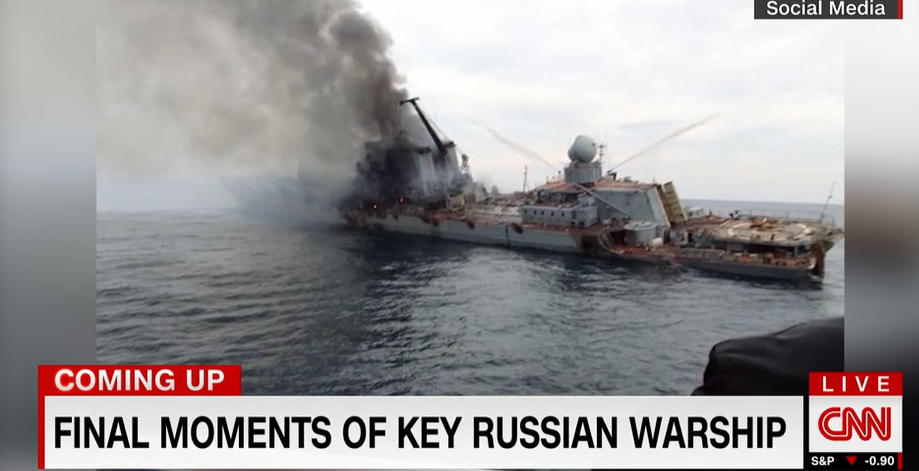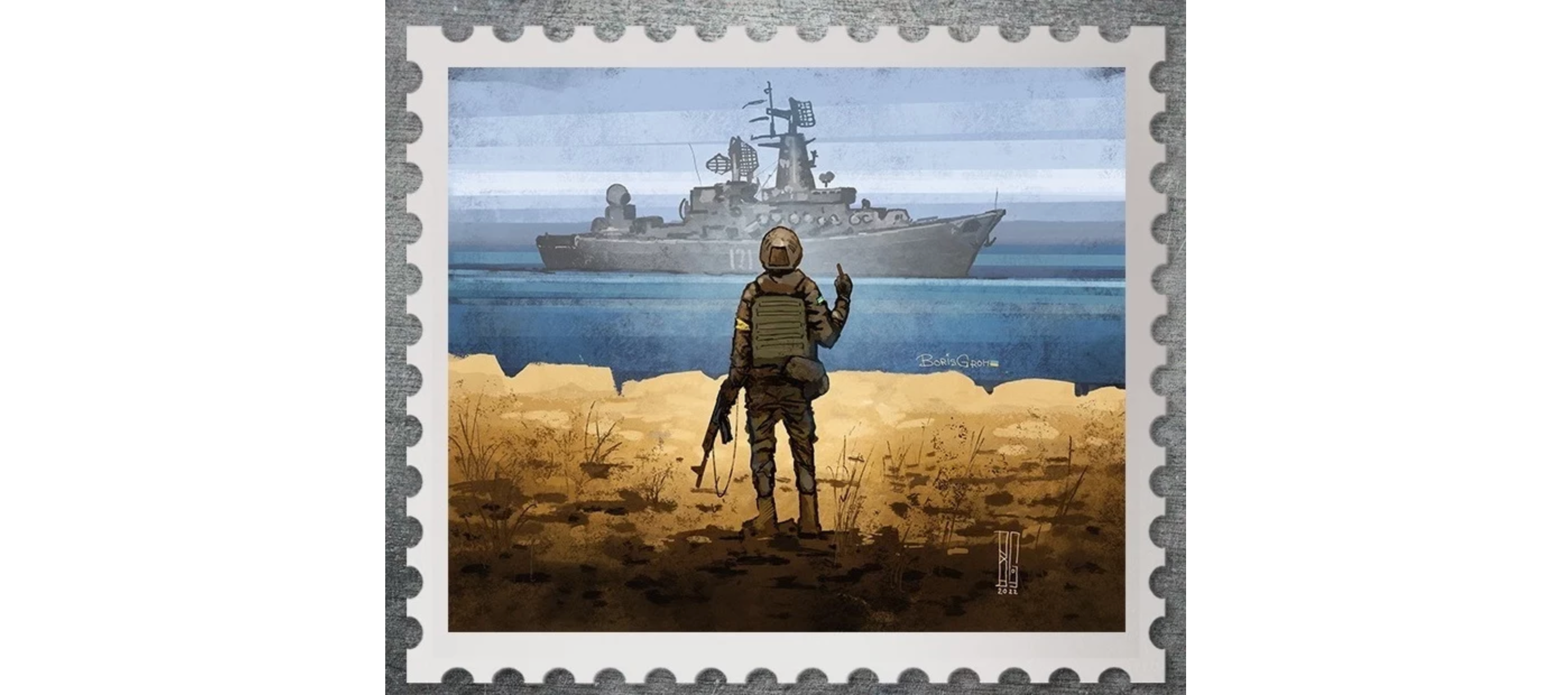
UPDATE:
Photos and video are emerging on social media purporting to show the stricken Moskva before it sank.
Original Story:
While the stories on how it happened vary widely, the end result remains the same.
The 12,500-ton guided missile cruiser Moskva, the pride and the flagship of the Russian Black Sea Fleet, named after the Russian capital, now rests ingloriously at the bottom of the Black Sea along with its missiles and weaponry that would have been used against Ukraine and its people.
While even the number of lives lost is being obfuscated by the Russians, it is hoped not too many of its crew – normally about 500 sailors — went down with the ship.
The 612 feet long Moskva, originally christened Slava, or “Glory,” sank Thursday, reportedly in a storm as it was being towed to a port in Crimea for repairs.
According to Ukrainian officials and confirmed by the Pentagon and others, Ukrainian forces had struck the Moskva with two RK-360 Neptune anti-ship cruise missiles one day earlier causing “serious damage.” The truck-mounted Neptune missiles can hit targets up to 175 miles away. Sailing about 70 miles south of Odessa, the Moskva was well within that range when it was struck.
The Russians claim an accidental fire broke out aboard the Moskva causing an ammunition explosion.
The whole truth about the Moskva’s demise will eventually be known. For now, it depends on whom one believes. The reputable Institute for the Study of War (ISW) writes, Ukrainian forces “likely have the capability” to have hit the Moskva. It adds, “Both explanations for the sinking of the Moskva indicate possible Russian deficiencies—either poor air defenses or incredibly lax safety procedures and damage control on the Black Sea Fleet’s flagship.”
Regardless of the specific circumstances, the loss of the Moskva is a major symbolic victory and morale booster for Ukraine and a major embarrassment and a bitter loss for Russia, in particular for Putin.
Many will remember that this was the same vessel that, during the early days of the Russian invasion, demanded that Ukrainian border guards stationed on Snake Island surrender. The famous response, “Russian warship go f*ck yourself” has now been immortalized on a Ukraine postage stamp issued (one million of them) by Ukraine’s national postal service the day before the attack on the Moskva.

It certainly is what the Military Times calls, “a devastating symbolic defeat for Moscow,” especially as Russia retreats from the north and regroups for a major, renewed offensive in eastern and southern Ukraine.
Patrick Conin at the Hudson Institute calls the loss of the Moskva, regardless of the cause, “a symbol of Putin’s disastrous strategic gamble on war” with Ukraine.
Katarzyna Zysk, a professor at the Norwegian Institute for Defense Studies in Oslo, puts it this way:
Losing the flagship of the Russian Black Sea Fleet is like losing a crown jewel: a serious prestige damage, which, I believe, has likely hit Putin personally given how much importance he has attached to rebuilding Russia as a naval great power.
But more than symbolic and more than just a blow to Putin’s prestige, it is a real and sizeable loss in Russian naval capabilities at a critical time in its war on Ukraine.
The loss of the Moskva, armed with multiple cruise missiles, anti-ship and surface-to-air missiles, and the only ship of its class in the Black Sea significantly reduces the Russian navy’s firepower in that strategic body of water.
The two other Russian missile cruisers – the Marshal Ustinov and the Varyag – are deployed with Russia’s Northern and Pacific fleets respectively, and it would be difficult for Russia to quickly sail them into the Black Sea. Additionally, Turkey has said it will not allow ships into the Black Sea that don’t have a homeport there.
In addition to its mission as a powerful, stand-off guided missile cruiser, the Moskva served a key role as both a command and control ship and in providing critical “area air defence cover to naval assets as well as shore bombardment and land attack.” It would have played an important role in what may be next on Putin’s mind: An amphibious assault on the key coastal city of Odesa, Ukraine’s third largest city and Putin’s much sought-after prize. “While other landing ships would have been used to bring Russian naval infantry to the coastline, the Moskva would have protected those ships and launched missile strikes on the city,” writes the New York Times.
While, prior to the Moskva attack, Russian warships were operating in the Black Sea with relative impunity, the loss may force the Russians to move its vessels further away from the reach of the Neptune missiles and to deploy additional point and air defense assets to the Black Sea
The loss of the Moskva, the largest warship lost in combat since World War II, may not significantly alter the course of the war but it may provoke a humiliated, vengeful, backed-into-a-corner Putin to commit even more desperate acts of aggression and horrific atrocities on all fronts.
Just one day after the sinking of the Moskva, Russia’s Defense Minister promised “to ramp up missile attacks on the Ukrainian capital.”
On Friday, perhaps tacitly acknowledging the fact that Neptune missiles had hit the Moskva, the Russians targeted munitions and armament factories in Kyiv seriously damaging the Vizar factory on the edge of the city, reportedly the plant involved in the production of the Neptune missile. The Neptune missile, based on an old Soviet cruise missile was developed by the Luch Design Bureau also located in Kyiv. Lviv and Kharkiv were also bombed and struck by missiles, respectively.
Also on Friday, and while still denying that the Moskva had been attacked, Russia’s Defense Ministry warned it will increase strikes in retaliation for hits on Moscow’s assets.
Before the Moskva attack, Russia had already formally warned the United States and NATO of “unpredictable consequences” if shipments of advanced weaponry to Ukraine continued — shipments that were “adding fuel’ to the conflict.”
Even more foreboding, on Friday, Ukraine President Zelensky warned that Russia might even use (tactical) nuclear weapons out of desperation. A sentiment that has been previously echoed by others, including CIA director William Burns, who said in public remarks at Georgia Tech on Thursday:
Given the potential desperation of President Putin and the Russian leadership, given the setbacks that they’ve faced so far militarily, none of us can take lightly the threat posed by a potential resort to tactical nuclear weapons or low yield nuclear weapons.
While the sinking of the Moskva is a clear victory for Ukraine and ignominy for Russia, no one knows how it will alter the course of this unprovoked war for, while the truth is known, the consequences have yet to play out.
In his “Ukraine’s Sinking of the Moskva Encapsulates the War – but Won’t Decide It,” Anshel Pfeffer at Haaretz perhaps expresses our hopes and fears best.
“After 50 days of war, the morale boost for the Ukrainians in striking such a major symbol of Russian military power is immense. The next 50 days will bring new challenges, though,” he writes.
CODA: For an interesting and detailed history of the Moskva and for a ”blow-by-blow” account of the attack on the ship, please read “Historic loss of flagship deals humiliating blow to Russia’s naval power” at none other than the Kyiv Independent, “Ukraine’s English-language media outlet.”
















